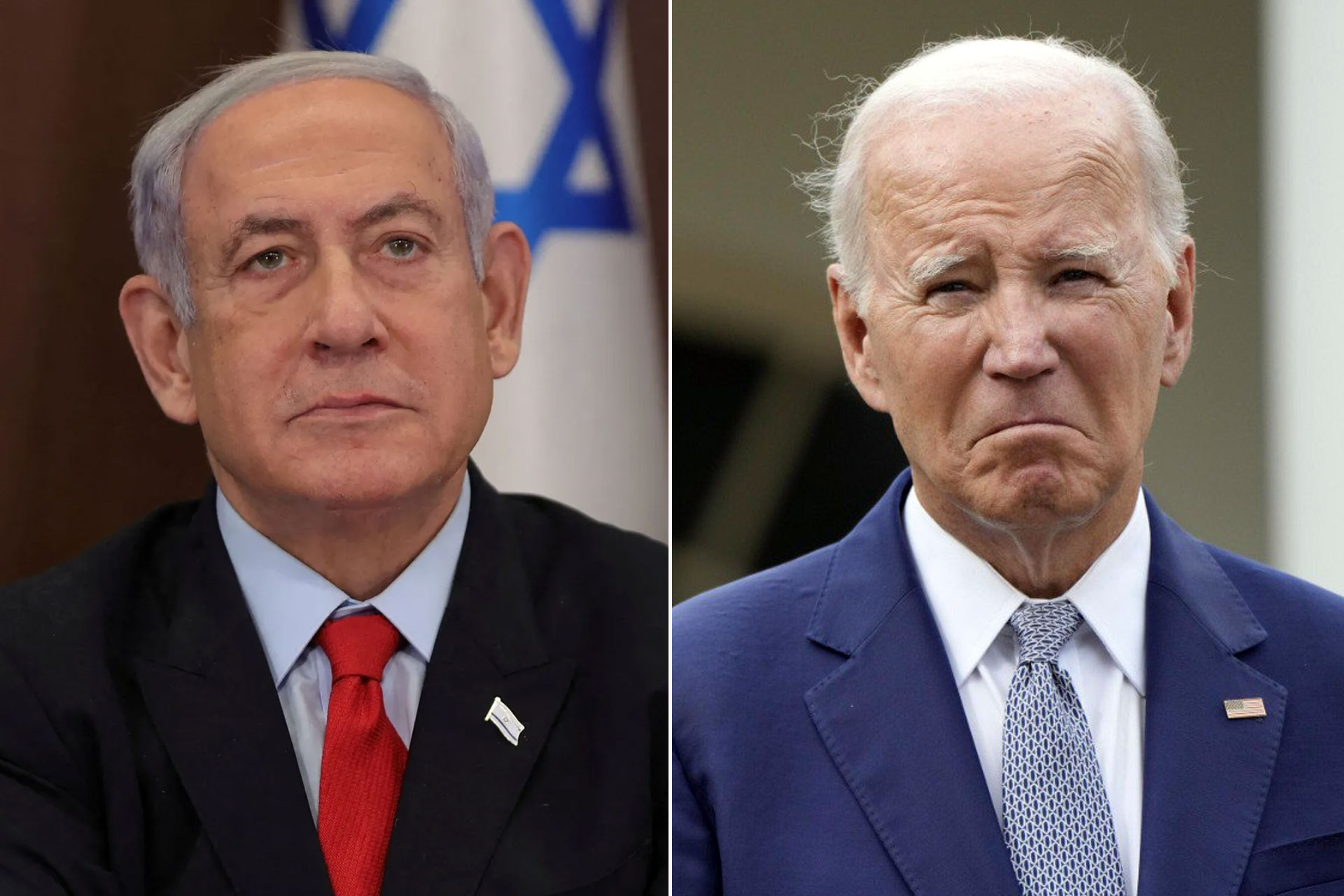US President Joe Biden (right) and Israeli Prime Minister Benjamin Netanyahu (agencies)
The international community, led by the United States, continues its pressure to dissuade Israel from launching a large-scale attack in Rafah, where approximately 1.5 million Palestinians are besieged on the border with Egypt.
After more than 4 months of Israeli aggression against the Gaza Strip, military operations are concentrated in the south of the besieged and destroyed Strip, specifically in the city of Khan Yunis, as well as in Rafah.
The Ministry of Health in Gaza reported that 112 martyrs were killed on Friday night throughout the Gaza Strip.
Call between Biden and Netanyahu
US President Joe Biden warned in a phone call with Israeli Prime Minister Benjamin Netanyahu on Thursday evening against Israel launching an operation in the city of Rafah without a plan to protect the safety of civilians.
The White House said in a statement that Biden "reiterated his position that any military operation should not take place without a reliable and implementable plan that guarantees the security of civilians in Rafah."
During the phone conversation, Biden also affirmed his commitment to work tirelessly to ensure the release of all detainees as soon as possible.
Israel says that 130 are still detained in Gaza, including 30 believed to have died, out of about 250 detainees on October 7.
Netanyahu announced a "strong move" in Rafah to deal a "deadly blow to Hamas," but said that his army would allow civilians to "leave the combat zones" without specifying the destination.
According to the United Nations, about 1.4 million people, most of them displaced due to the war, are gathering in Rafah, which has turned into a huge camp, and it is the only large city in the Strip that the Israeli army has not yet invaded by ground.
The United Nations said that "more than half of Gaza's population is crowded into less than 20% of the area of the Gaza Strip."
Rafah is also the main entry point for aid from Israel-controlled Egypt, although the aid that enters through this port represents only a small percentage of the needs of a population threatened by famine and epidemics.
Also in this context, British Prime Minister Rishi Sunak told Netanyahu on Thursday that negotiating a humanitarian truce in the Gaza Strip is an “immediate priority,” according to Downing Street.
Sunak spoke by phone with Netanyahu in the afternoon and “reiterated that the immediate priority must be to negotiate a humanitarian truce to allow the safe release of detainees and facilitate the delivery of further aid to Gaza, leading to a permanent ceasefire in the long term,” the spokesman said. British Prime Minister.
Nasser Hospital
Yesterday, the Israeli army confirmed on Thursday that its special forces entered the Nasser Medical Complex, the largest in Khan Yunis, the largest city in the southern Gaza Strip. The hospital receives thousands of civilians fleeing the war, whose evacuation began under bombing in recent days.
The Israeli army said that it was carrying out a “precise and limited operation” in the hospital, after obtaining “intelligence information indicating the presence of detainees in the hospital and that there may be bodies of some of them.”
The new Israeli incursion and storming of Nasser Hospital raises new fears about the fate of hundreds of patients, medical personnel, and many displaced people who took refuge there to escape the war.
Palestinian state
After his phone conversation with Biden, Netanyahu on Thursday evening rejected any international recognition of a Palestinian state outside the framework of the resumption of Israeli-Palestinian peace talks.
“Israel will continue to oppose unilateral recognition of a Palestinian state,” Netanyahu wrote in Hebrew on the X platform. “Such recognition, in the wake of October 7, would provide a massive reward for unprecedented terrorism and prevent any future peace agreement.”
He added, "Israel absolutely rejects international dictates regarding a permanent settlement with the Palestinians," stressing that a peace agreement can only result from "direct negotiations without preconditions."
The far-right Israeli Ministers of National Security and Finance, Itamar Ben Gvir and Bezalel Smotrich, also rejected a plan in this context on Thursday, which was reported by the American newspaper The Washington Post.
The newspaper reported that the United States, Israel's main ally, is working with Arab allies on a complete plan to establish lasting peace between Israel and the Palestinians, which includes stopping the fighting, releasing detainees, and setting a timetable for the eventual establishment of a Palestinian state.
The Washington Post quoted American and Arab officials as saying that the implementation of this plan will begin with a ceasefire “expected to last at least 6 weeks” with the hope of reaching an agreement before March 10, the start of the month of Ramadan.
However, this plan was denounced by the two extreme right-wing Israeli ministers, who considered that “a Palestinian state would constitute an existential threat to the State of Israel.”
Since the seventh of last October, Israel has been waging a devastating open war on the Gaza Strip, which has so far resulted in the death of about 28,663 people, the majority of whom are women and children, and has also forced almost the entire population of the Strip, numbering approximately two million people, to flee.
Source: Agencies

